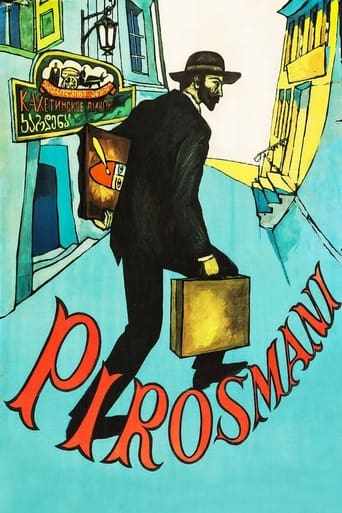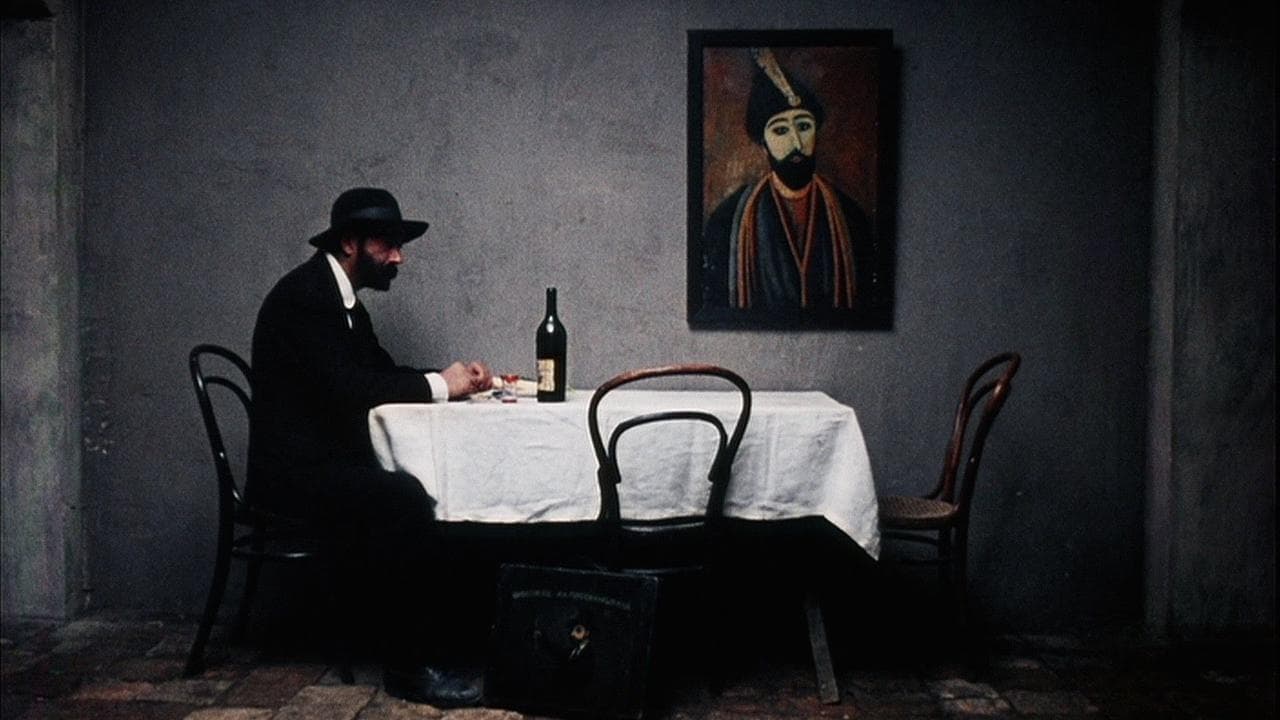Armand
at whole. for story of Pirosmani, one of the greatest Georgian art legends. for the impression of walk in a pinacotheque. for strange feeling about a classic story of an artist who tries remains himself against social pressure. a film about life. not different by many Georgian films of period but convincing thanks to a simple script and acting of Avtandil Varazi. the ash taste, melancholic slices, a lot of silence walls. and confession of a man for who existence is a form of fly, for who the freedom is essential value.far to be perfect, it seems be memorable. for the deep roots, for bitter images, for clear message, for the taste of honesty. a film who can remember basic things who lost their death.
Sherparsa
well, is there 100 *s possible on IMDb? no, really, i mean 10 stars would not do justice to this jem of movie masterpiece imo ... had heard about this movie and loved what i had heard about it before even watching it in a theater years later ...was worried extremely if the movie itself would defy my own expectations of it that i had based on hearing about it alone (as it may so happen with many movies or books we hear about first and then watch or read later ...) surprise! the movie was even better, much better! and luckily, i was in an extremely rare good mood too when entering the salon and taking my seat, which guaranteed one of the finest movie watching experiences to happen to me, ever.did i say sometimes one's life can be changed by a piece of art ... yes, sure, but in case of this "piece of art" my life did not quite change as it was elevated so highly into a higher level, of not only deeper awareness of certain already familiar aspects in my own life, but also to getting to know i'm not the only one in this world with such abstract visions in my mind ... (but i have to admit that i'm one of those unable to turn those visions into actual visual images on screen although i am into photography and movie making myself!) hail on thee both Pirosmani and Shengelaya ... for being what you are ...
oOgiandujaOo_and_Eddy_Merckx
I was a bit suspicious of this film as it is a biopic (if need must that it conform to a genre pigeonhole). For me biopics pander to the cult of celebrity, no such thirst needs slaking. However once in a while one comes along that is not merely pablum. Such a film is Giorgi Shengelaya's Pirosmani.It's a film about Nikolai Pirosmani, who was a naive artist, that is the word, I believe, used for people like Henri Rousseau, who is the famous example, who haven't been trained formally to paint but come up with their own highly expressive style often luminous and ethereal. Pirosmani's paintings can be found online by a simple search and are good background for watching the film. His work reminds me of el Greco, in it's luminosity and generally weight of significance. One of the shots in the film was quite educational, Pirosmani was painting on a canvas that was painted black beforehand. I've heard of painters painting on a canvas they've painted white beforehand, to give light. Perhaps this Pirosmani technique helps the luminous colours he uses stand out more. Anyway it was interesting and showed minute attention to detail from the filmmakers.The film is quite interesting because for quite a lot of his life he was unknown and even sold groceries and worked on trains before painting for a living. In the town he lived in from time to time, Tiflis, he had painted pictures for all of the bars in the town. I think one of the saddest moments of the film was when they showed him walking around town as an old man and all the tavern owners had sold his paintings because they had become worth money, and so the taverns were no longer pretty, and the town felt soulless.There is some interesting camera-work here, the film is shot in a formalist manner mostly, so lots of static, rectilinear shots, and formal composition, but also it is very magic real, which goes well together. The style also serves to heighten the effect when any moving shots are used.I think this Pirosmani as portrayed in this film was a very lonely guy, he never settled down and had a family and he tended to move around a lot, so it was a sad film. But his paintings in it were very beautiful, and the film is very educational, as even with a strong interest in painting I had never heard of Niko Pirosmanashvili before. There are some experimental things going on, we have Pirosmani turn into a child at one point when he is retracing the footsteps of his youth, and also some very surreal moments when he is talking to old friends of his. Clearly enough artistic content to satisfy those weary of conventional genre tropes.His stint as a shopkeeper is the most interesting part for me, he ends up not being able to hack it, he gets swindled, and the needy are always asking him for charity, which he seems unable to refuse. In the last scene of his time running a shop, he asks the prince's chef for 5 roubles, when the usual price of the groceries request is 80 kopecks, ie. he wants 6 times the normal price. The prince can obviously afford this, but the chef isn't going to take this treatment on principle and marches out. Then when a group of beggars (mostly children) wander in after the chef, quite surreally he ends up loading them down with the entire shop's produce for free, in one scene he pours a bowl of honey straight into a child's hand (this for me is a heartbreaking scene, full of tenderness and humanity). At this point he closes the shop down as shopkeeping is clearly not for him.The central problem of his existence appeared to be his humanity, too sensitive and honest to mesh into the gears of societal norms he led a phantom-like existence tavern-hopping. Two artists in the film seem to be perpetually looking for him throughout the whole storyline as is they were ghost hunters. Whenever we see Niko at a social gathering he is like a restless spirit tied down to the earth, perplexed. His end seems almost intuitive from the start of the film, he dies alone in a hovel of a room underneath a staircase.The entire film is not dour, there seems much of the Georgian spirit and occasional humour in it, at a wedding feast some men singing a mesmerising dirge (or if not a dirge, something entirely sombre) are interrupted by a matriarch striking up something altogether more gleeful on her accordion.It it perhaps the most beautiful magic real film I have ever seen. One of my favourite scenes to remember is perhaps the scene where he sits down in a theatre and watches the actress Margarita twirl and dance singing a French song. He is not one of the living so he does not applaud, he does not hurry to the stage door or make entreaties at the dressing room door. He disappears and paints a wonderful picture of her. For anyone who has ever felt this sort of "otherness", Pirosmani is a must see.Long live Georgian cinema!
Andres Salama
This little known film is quite strange yet well worth watching. Made in 1969, it tells the story of one Nico Pirosmanishvilli or Pirosmani, a primitive Georgian painter, not very well known in the west, who lived at the turn of the last century. The movie shows his paintings (I must admit I was not terribly impressed by them), his proud poverty, his antisocial behavior. A lot of the movie is shot in sparse, mildly surreal tableaux. When he sets up a shop with his brother, for example, it is not located in the city, but in the middle of a plain. There are some fine shots of the old, dilapidated quarters of Tbilissi, where Pirosmani lived since middle age, barely making ends meet by painting in taverns. I don't know if there is a Caucasian school of film-making, but this film suggests a saner, decaffeinated Paradjanov (who, as a matter of fact, did film a short about Pirosmani).


 AD
AD

